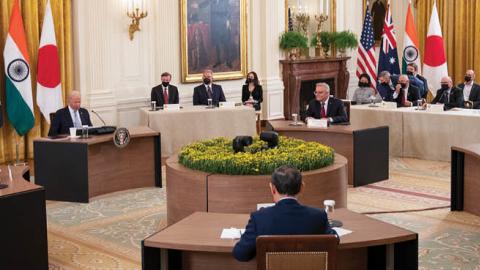The leaders of South Korea and the United States must pave a new path. President Yun Seok-yeol took office, emphasizing the expansion of Korea's status and role on the world stage. US President Joe Biden also made South Korea the first destination on his Asian tour to highlight the potential for strengthening cooperation with key allies. Therefore, the outcome of this summit should show a new destination for the ROK-US alliance.
The first challenge facing the leaders of the Republic of Korea and the United States is to devise a 'Goldilocks (optimal state that is neither cold nor hot)' to correct North Korea policy. The process of exploring this must start with understanding the limitations of the ROK-US alliance, what it can and cannot do. The ROK and the United States need to increase their understanding of North Korea's strategy and prevent North Korean leader Kim Jong-un from receiving compensation in exchange for increased arms. Only then can the window of genuine dialogue through diplomacy remain open. If South Korea and the United States respond to North Korea's nuclear threat in return and neglect their duty to defend themselves, they fall victim to the delusion that appeasement will change the dictator's strategic goals. That would be irresponsible foreign policy.
Moving away from the Moon Jae-in administration's strategy of relying on goodwill to appease Chairman Kim, the ROK and the United States should focus on strengthening deterrence and expanding defense cooperation with like-minded partners such as Japan. Reinforcing extended deterrence requires action as well as dialogue.
At the summit, the two leaders held regular strategic talks to resolve questions about the development and additional deployment of advanced conventional weapons, such as 'low-yield' nuclear weapons, hypersonic missiles, and missile defense systems (MD), which are on the sensitive agenda between the ROK and the US. importance should be emphasized. Under President Yun's 'two-track' approach to North Korea, the two leaders should also discuss large-scale humanitarian and medical aid to North Korea, which will enter into a long fight against the spread of the deadly novel coronavirus infection (COVID-19).
The ROK and US leaders can also change the course of the alliance through the security network. Through this, President Yoon can fulfill his promise to expand cooperation with Japan and other countries. President Biden can also help open the door to collaboration with like-minded partners across Europe and the Indo-Pacific on both ends of the Eurasian continent. Security networks provide a framework for cooperation that can pragmatically solve security problems with various partners without guarantees of mutual defense. Therefore, it is in the interests of all three countries for South Korea to strengthen defense cooperation and information sharing with the United States and Japan.
Supporting Korea to participate in the 'Quad' working group that deals with global supply chains and clean energy can create new positive values for quad member countries such as the US, Japan, India, and Australia. Involving Korea in the field of technical cooperation related to AUKUS, in which the US, UK, and Australia participate, will also be a way to contribute to Korea's influence beyond the Korean Peninsula.
As Russia's brutal war is taking a toll locally and globally, it is also necessary for Korea to share the burden on the international community beyond the Indo-Pacific. Providing humanitarian aid to Ukrainian refugees is a simple task. It can also be easy to show the value of joining the North Atlantic Treaty Organization (NATO) Cyber Defense Center as Asia's first member state by taking the lead in providing best practices for fighting North Korean hacking. Also at the US-ROK summit, the two leaders could declare their support for expanding South Korea's role in a rules-based international order, including the expansion of the G7.
President Yoon's promise to become a founding member of the Indo-Pacific Economic Framework (IPEF) could go beyond expanding participation in existing international partnerships while managing the difficult-to-resolve North Korea problem. IPEF is designed to lead the digital economy by establishing secure supply chains, reliable information and communication, and fair and high standards. The IPEF will pave the way for the Yun Seok-Yeol government to realize its aspirations to play a key role around the world over the next several years.
IPEF is a promise to respond to the strategic field of the 21st century economy defined by the 4th industrial revolution. President Yoon had a special opportunity to be the first participant in this plan. Now is the time to show the world that Korea is one of the world's leading countries in every way. President Yun can enjoy the results for five years, and no other ally will support it more than President Biden.
Read in Dong-A Ilbo

















